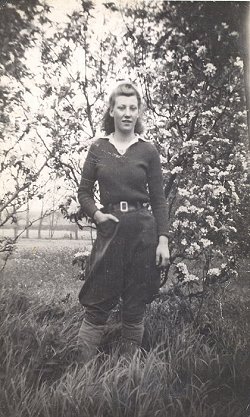Bedfordshire Land Girl Memoir
Bedfordshire Women's Land Army | Land Girl Memoirs
Leighton Buzzard Hostel
Mary Stoke nee Henman
(WLA 118846: 6 May 1943 [one year break in 1945-6] 17 September 1949)
 Mary
served first at Potton WLA Hostel in the north-east of the county, employed by
the Bedfordshire War Agricultural Committee during the war. She left the WLA at
the end of the war for a one-year break, but rejoined, post war because she
missed the camaraderie of hostel gang life.
Mary
served first at Potton WLA Hostel in the north-east of the county, employed by
the Bedfordshire War Agricultural Committee during the war. She left the WLA at
the end of the war for a one-year break, but rejoined, post war because she
missed the camaraderie of hostel gang life.
Our gang of land girls
"I was billeted with a grand bunch of girls at Leighton Buzzard and we got on famously. My best friend, Irene Thurley, came from Manchester. We nicknamed her 'Dizzies' 'cos she really was! In fact, we gave all our gang nicknames. Being so tall, I was obviously called 'Lofty'. Another girl from Luton, who always tanned to a deep brown in the sun, became 'Darkie' Dolby. Our driver, a little snip of a girl, was called 'Midge', and if you ever saw her behind the wheel of one of our huge lorries, she really did look a 'midge'. Finally, in our little gang, there was Grace Brammell from Toddington, whom we christened 'Red' because of her flaming red hair.
The hostel
Our hostel was on the outskirts of Leighton Buzzard, in Hockliffe Road. The dormitory was divided into sort of cubicles for four girls, with two double-tier bunks on each side. There were no wardrobes or any such luxury. Each girl had a large box to put her belongings in, which was kept under the bunks. We did have a small dressing table which was shared by two girls, with two drawers for one, and two drawers for the other. Nothing was lockable. If you had any valuable at all, you gave it to the Warden of the hostel to take car of.
Post-war rations
As everything was still on rations, or 'points', you were very limited as to what you could buy but at least the shopkeeper could no longer use the phrase he used to: "Don't you know there's a war on?".
"Men's work"
Our gang was sent all over the county to different farms, doing jobs which would normally have been carried out by men: threshing, haymaking and field work. It was often very hard and dirty and it also had moments of danger. One day I was working on top of a hay cart, stacking the hay as it was thrown up, when I slipped. Falling down from the high load. I could so easily have landed on the pitch fork which was resting, points upwards.
Farm animals
Farm animals were always a favourite of mine, although, apart from experience with cows on my first tour of duty with the Land Army [see Potton hostel page] I rarely got the chance to see or work with any, except perhaps an old bull or a few sheep. And there had been Daisy, our lovely old market garden work horse, who was allowed to lead on her own.
Market garden work
As well as field work, I was also sent to work for the old Duke of Bedford at nearby Woburn Abbey in the market gardens there. We were sometimes sent to Whipsnade Zoo, in the south of the county, to work on the market gardens which had been set up there during the war. We used to love it because, during our lunch break, we would wander round and see all the animals there.
Food and deadlines
Sometimes we were fortunate enough to work for a farmer whose wife would make us hot drinks to have with our lunch but this was a rare treat, as was the special gift of a few potatoes, or even a tomato o two to take home to our mums at the weekends, after finishing work on a Saturday at 12.30. We had to be back in the hostel by 9.30pm on the Sunday night. Some of the girls, though, would get back late an one of us would always be on hand to open a window for them to climb in through, as we were billeted in ground floor huts.
Sing-songs on the trucks
After a hard day's work, the trucks would go the rounds picking up the girls form their various farms, tired and usually very dirty on most days. Despite that, on the way back to the hostel, we always seemed to manage a sing-song. One of the songs that always seemed to turn up was sung to the tune of "She'll be coming round the mountain, when she comes":
"If you want to go to Heaven when you die.
Wear a pair of corduroy breeches and a tie,
And a little felt bonnet, with WLA on it,
If you want to go to Heaven when you die."
Hostel entertainment
Back at the hostel we had an old 'wind-up' gramophone (noTVs then). Every land girl who lived there gave sixpence [6d equals 2-p] to purchase a record (shellac discs cost about two shillings and eleven old pence about 12p today) and each girl got to choose her record. I remember that my choice was Alan Jones singing "The Donkey Serenade" what a joy!
Winter work
worked as threshing gangs, which we all hated. Another task that none of us particularly liked was picking brussell sprouts on a cold and frosty morning when, after a few minutes, you could not feel your finger tips because they were frost-bitten. One jobs that we did enjoy on a cold winter's day was 'hedging and ditching' because we always lit a huge bonfire with all the cuttings and we were never cold then.
Last days as a 'land girl'
We left the Women' Land Army just as you would an ordinary job just a few week's notice, then 'goodbye' no recognition of our service to our country. I enjoyed most of my time with the Land Army and stayed in touch with some former land girls for the rest of my life."
Stuart Antrobus Historian/Author
Page last updated: 10th March 2014

